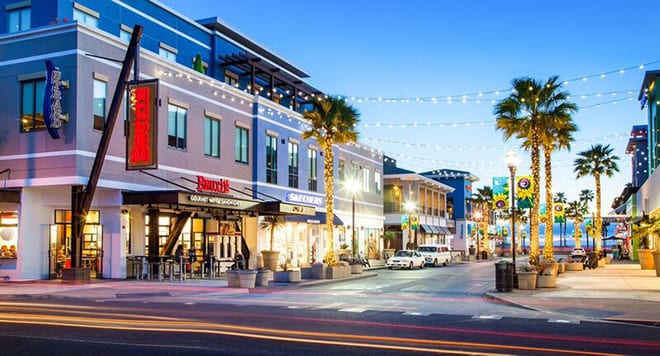Civic operational intelligence is not the preserve of the world’s mega-cities, said Dutch lighting company Signify, formerly Philips Lighting, as it continued deployment of 5G street-lighting poles with American Tower in Huntington Beach, in California.
“Small and medium cities should not underestimate the opportunities they have to get exactly the same opportunities and returns as the bigger cities,” said Chris White, chief executive of Signify in the Americas.
“There is a cycle. The tech titans have wanted to jump onto the big cities because of the amplifier effect. But Huntington Beach is a fraction the size of LA, and those guys are finding innovative ways to be competitive – under same budget constraints as the rest of us.”
Signify and US tower operator American Tower are installing LED lighting and mobile connectivity on 200 light poles in the City of Huntington Beach, in southern California. The poles are situated along the Pacific Highway and downtown areas, close to restaurants and retail establishments.

The so-called Smart Fusion Pole, developed by the pair, provides the infrastructure for wireless broadband connectivity, as well as energy efficient lighting and control, in a street light pole that blends into the urban landscape, according to its makers.
The pole is optimised for small cell deployment; its plug-and-play design provides access for next-generation technologies, including 5G and sundry low-power wide-area (LPWA) ‘internet-of-things’ (IoT) technologies Antennas concealed within the pole can support services from multiple mobile operators on a single pole.
Huntington Beach is the first city to utilise the shared infrastructure.
“The project was originally about upgrading lighting infrastructure. But the conversation quickly moved to 5G – and the benefits to both operators and visitors to the city. It’s a surf capital, with a lot of tourist dollars. And so these poles started to be looked at differently,” White said, in interview with Enterprise IoT Insights.
“It’s a standard looking street lighting pole. But inside, you have the real estate to use to put in 5G antennas and any additional sensors. It means the city is spared these horrendous bolt-on antennas. It also allows carriers to provide the kind of density of coverage needed for IoT applications.”
White joined Signify at the start of the year, prior to its rebrand from Philips Lighting. He was at Cisco for two decades, eventually as senior vide president for IoT sales and strategy. His stint in charge of IoT for Cisco saw him engage closely with Barcelona, in Spain, as it pioneered a template for smart cities across the globe.
Asked if smart city technologies are too focused on big urban centres, rising creating a digital divide between global capitals and tier-two cities and towns, White said even the work Barcelona proves the technology is available to all.
“There is nothing better [for marketing] than to use a big city name every one can relate to. That’s just the nature of the beast. But that doesn’t mean it only works for mega-cities,” he said.
“What was fascinating about Barcelona, which everyone knows around the world [as a smart city], is that if you delve into the detail of it, at least during the few years I was involved, the size of deployment was probably only equivalent to small or mid-sized city.”
The Smart Fusion Pole integrates Signify’s Hadco and Lumec LED luminaires. At its announcement back in February, Mike Posey, Mayor of the City of Huntington Beach, said the Huntington Beach was aiming for the stars, amid the smart-city firmament.
“We want to be a leader in smart city initiatives… [This] provides the connectivity required for our smart city initiatives without sacrificing the beauty and vista of our city,” he said.

